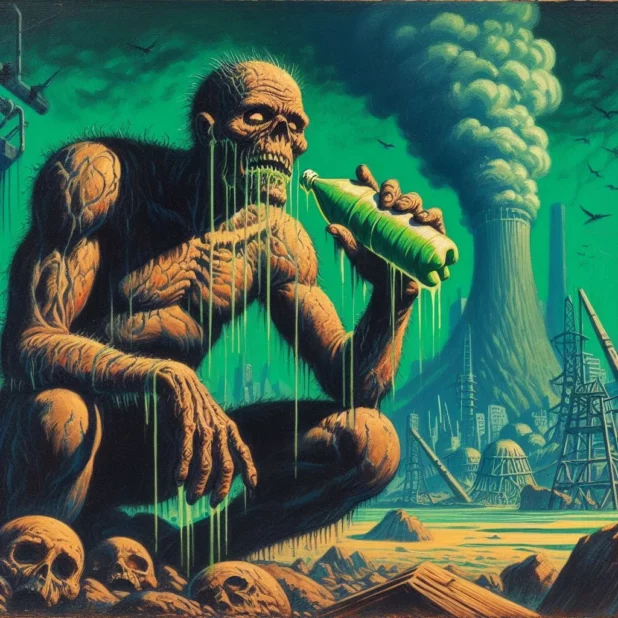You have to incinerate plastic. There is no other solution to it. If you don’t burn it, it goes into the water, and into your body.
It cannot be recycled in a way that does not produce more chemical waste than simply making new plastic. This has been known for decades. It was just ignored because plastic recycling is an industry that makes money and also makes people feel good.
And you can’t burn it, because it will change the weather. It would be better then to seal it and bury it, but there’s no money in that. So you just have to dump it all in the water and become fat and gay.
Plastic producers have known for more than 30 years that recycling is not an economically or technically feasible plastic waste management solution. That has not stopped them from promoting it, according to a new report.
“The companies lied,” said Richard Wiles, president of fossil-fuel accountability advocacy group the Center for Climate Integrity (CCI), which published the report. “It’s time to hold them accountable for the damage they’ve caused.”
Plastic, which is made from oil and gas, is notoriously difficult to recycle. Doing so requires meticulous sorting, since most of the thousands of chemically distinct varieties of plastic cannot be recycled together. That renders an already pricey process even more expensive. Another challenge: the material degrades each time it is reused, meaning it can generally only be reused once or twice.
It’s like a civilizational scale version of an obsessive compulsive washing his hands over and over.
The industry has known for decades about these existential challenges, but obscured that information in its marketing campaigns, the report shows.
The research draws on previous investigations as well as newly revealed internal documents illustrating the extent of this decades-long campaign.
Industry insiders over the past several decades have variously referred to plastic recycling as “uneconomical”, said it “cannot be considered a permanent solid waste solution”, and said it “cannot go on indefinitely”, the revelations show.
The authors say the evidence demonstrates that oil and petrochemical companies, as well as their trade associations, may have broken laws designed to protect the public from misleading marketing and pollution.
Yeah.
I know.
I fucking knew that already. Anyone could have known it if they spent 20 minutes reading about the issue. Instead, they just did what the government said, because that’s the nature of the peasantry. They are like animals. They will poison the entire earth, make the planet uninhabitable for living beings, because the government told them a lie that could have been disproved beyond any reasonable doubt in the amount of time it takes to drink a cup of coffee.
It’s almost like all authority in society should be given to some kind of meritocratic intelligentsia.
Maybe you could call it an “aristocracy,” from the Greek “aristos” (best) and “kratia” (power).
The industry has long known that plastics recycling is not economically or practically viable, the report shows. An internal 1986 report from the trade association the Vinyl Institute noted that “recycling cannot be considered a permanent solid waste solution [to plastics], as it merely prolongs the time until an item is disposed of”.
In 1989, the founding director of the Vinyl Institute told attendees of a trade conference: “Recycling cannot go on indefinitely, and does not solve the solid waste problem.”
Despite this knowledge, the Society of the Plastics Industry established the Plastics Recycling Foundation in 1984, bringing together petrochemical companies and bottlers, and launched a campaign focused on the sector’s commitment to recycling.
In 1988, the trade group rolled out the “chasing arrows” – the widely recognized symbol for recyclable plastic – and began using it on packaging. Experts have long said the symbol is highly misleading, and recently federal regulators have echoed their concerns.
The industry’s misconduct continues today, the report alleges. Over the past several years, industry lobbying groups have promoted so-called chemical recycling, which breaks plastic polymers down into tiny molecules in order to make new plastics, synthetic fuels and other products. But the process creates pollution and is even more energy intensive than traditional plastic recycling.
The plastics sector has long known chemical recycling is also not a true solution to plastic waste, the report says. In a 1994 trade meeting, Exxon Chemical vice-president Irwin Levowitz called one common form of chemical recycling a “fundamentally uneconomical process”. And in 2003, a longtime trade consultant criticized the industry for promoting chemical recycling, calling it “another example of how non-science got into the minds of industry and environmental activists alike”.
We have to note, once again: this is in The Guardian.
Not the New York Times. Not the Washington Post. It’s not on CNN. It’s only in The Guardian, and on various racist and antisemitic websites.
See: Lego Stops Trying to Recycle Plastic, Says It’s Actually Worse for the Environment
One bottle of water is said to contain 240,000 nanoplastics!
Do you drink bottled water? pic.twitter.com/rCsDW4htlA
— Dr. Truth (@Tony11Sim) January 12, 2024
Elvis Dunderhoff contributed to this article.



